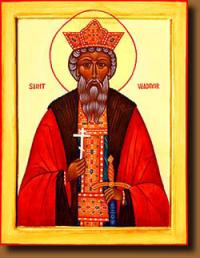
Feast day: 15 July.
St Vladimir was the illegitimate son of Sviatoslav by his housekeeper Malusha. Malusha is described in the Norse sagas as a prophetess, who lived to the age of 100 and was brought from her cave to predict the future. Malusha’s brother, Dobryna, was his tutor and most trusted advisor. He was designated ruler of Novrogod the Great in 970 by his father, who gave Kiev to his legitimate son Yaropolk. A war broke out between Yaropolk and his younger brother Oleg, ruler of the Drevlians (an Eastern Slavic tribe), which resulted in the death of Oleg and forced Vladimir to flee. He returned with an army and defeated and killed Yaropolk. He sent ambassadors to the Prince of Polotsk (now Belarus) to ask for the hand of his daughter Rogneda in marriage. The princess refused the offer since Vladimir was the son of a servant, so Vladimir took her by force.
Vladimir extended his territories by conquest. At this stage he was a pagan, although Christianity had spread under Oleg’s rule. He worshipped several gods, and had wives and concubines. However after attacks on Christians in Rus (modern day Belarus, parts of European Russia and much of the Ukraine) Vladimir began to think more about religion. He sent envoys to study the major religions of the time: Judaism, Islam, Latin Christianity and Byzantine Christianity. The envoys were impressed by their visit to Constantinople, saying: “We knew not whether we were in heaven or on Earth (...). We only knew that God dwells among the people and their service is fairer than the ceremonies of other nations.”
Many people arrived to try to convince Vladimir to convert to their religion. He hesitated for some time, although had rejected all options but Eastern Christianity. In 988 he took the town of Chersoneus in the Crimea and asked for the hand of the Byzantine Emperor Basil II’s sister Anna. There are various accounts of how this came about but it was highly unlikely an imperial princess would marry someone who was a pagan and regarded as a barbarian. Offers from the French Kings and the Holy Roman Emperors had been rejected out of hand. Vladimir, however, agreed to be baptised and the marriage took place.
He returned to Kiev and destroyed pagan monuments and founded many churches, starting with a church dedicated to St Basil and the Church of the Tithes. In 988 he baptised the Princes Metiga and Kuchung. He then formed a grand council of the boyars (nobles) and set his twelve sons over his principalities. According to the Primary Chronicle (a chronicle of Kievan Rus composed between 850 and 110) he founded the city of Belgorad in 991. In 992 he went on a campaign against the Croats who lived on the borders of what is now Ukraine. This campaign was cut short by the Pechenegs on and around Kiev; they were a Turkish nomadic tribe who were frequently in conflict with Kievan Rus. In later years Vladimir lived in relative peace with his neighbours. After his wife Anna’s death he married again, probably a granddaughter of the Holy Roman Emperor Otto the Great.
In 1014 his son Yaroslav the Wise stopped paying tribute. Vladimir gathered troops, intending to punish his son, but fell ill and died - probably of old age - at Berestove near modern Kiev. The various parts of his dismembered body were distributed among his numerous sacred foundations and were venerated as relics.
Since he became a Christian Vladimir followed the teachings of the Bible through acts of charity. He would hand out food and drink to the poor and made an effort to go out to people who could not reach him. He founded numerous churches, established schools, protected the poor and introduced ecclesiastical courts. He introduced the Byzantine Law code (a body of Roman law compiled by the Emperor Justinian I in the sixth century AD) into his territories but reformed some of its harsher elements.H e notably abolished capital punishment along with judicial torture and mutilation.
St Volodymyr’s cathedral in Kiev is dedicated to him.
St Vladimir the Great, pray for us.